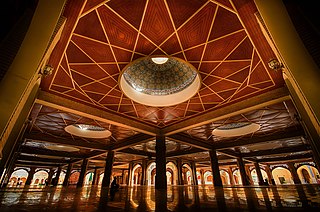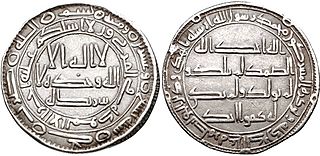Related Research Articles

Abd Allah ibn Abi Quhafa, commonly known by the kunyaAbu Bakr, was the first caliph, ruling from 632 until his death in 634. A close companion and father-in-law of Muhammad, Abu Bakr is referred to with the honorific title al-Ṣiddīq by Sunni Muslims.

The Rashidun are the first four caliphs who led the Muslim community following the death of Muhammad: Abu Bakr, Umar, Uthman, and Ali.

Kufa, also spelled Kufah, is a city in Iraq, about 170 kilometres (110 mi) south of Baghdad, and 10 kilometres (6.2 mi) northeast of Najaf. It is located on the banks of the Euphrates River. The estimated population in 2003 was 110,000. Currently, Kufa and Najaf are joined into a single urban area that is mostly commonly known to the outside world as 'Najaf'.
This is a timeline of major events in the Muslim world from 601 AD to 700 AD.

Muhammad ibn Abi Bakr ibn Abi Quhafa al-Taymi was an Arab Muslim commander in the service of the fourth Rashidun caliph and first Shia Imam, Ali ibn Abi Talib. Muhammad was the youngest son of the first Rashidun caliph Abu Bakr and Asma bint Umays.
Malik al-Ashtar, also known as Mālik bin al-Ḥārith al-Nakhaʿīy al-Maḏḥijīy was, according to Sunni view, one of the people involved behind Uthman's assassination. While, according to Shias, he was one of the loyal companions of Ali ibn Abi Talib, cousin of the Islamic prophet Muhammad. According to them, Malik remained a loyal and avid supporter of Muhammad's progeny and the Hashemite clan. He rose to a position of prominence during the caliphate of Ali and participated in several battles, such as the Battle of Jamal and Siffin against Mu'awiya. His title "al-Ashtar" references an eyelid injury he received during the Battle of Yarmouk.
Jābir ibn ʿAbd Allāh ibn ʿAmr ibn Ḥarām al-Anṣārī, Abu Muhammad and Abu Abd al-Rahman also wrote his nickname was a prominent companion of the Islamic prophet Muhammad. Imami sources say Jabir was one of Ali's special and chosen companions and one of Hassan, Hussein, Zain al-Abidin and Muhammad Baqir's companions. Jaber narrated hadiths from Abu Bakr, Umar, Ammar ibn Yasir and Muadh ibn Jabal, and he narrated hadiths from young companions including Saʽid al-Khudri and Abu Hurayra. Jabir bin Abdullah also had a scientific reputation among the companions. According to Hisham ibn Urwah, he had a circle for teaching in the Prophet's Mosque, which brought followers around him in connection with the Quran.
Ammar ibn Yasir was a companion of Muhammad and a commander in the early Muslim conquests. His parents, Sumayya and Yasir ibn Amir, were the first martyrs of the Ummah. Ammar converted to Islam by the invitation of Abu Bakr and was amongst the muhajirun. After the migration to Medina, he participated in building the Prophet's Mosque and fought in most of the early Muslim expeditions. He fought in the Ridda wars under Caliph Abu Bakr and in the Muslim conquest of Iran under Caliph Umar. Ammar served as governor of Kufa under Umar. Following Uthman's assassination, Ammar became a devout partisan of Caliph Ali and died while fighting on Ali's side in the Battle of Siffin.

The Four Companions, also called the Four Pillars of the Sahaba, is a Shia term for the four Companions of the Islamic prophet Muhammad who are supposed to have stayed most loyal to Ali ibn Abi Talib after Muhammad's death in 632:
- Salman al-Fārisī
- Abū Dharr al-Ghifāri
- Miqdad ibn Aswād al-Kindi
- Ammār ibn Yāsir
The Muhajirun were the converts to Islam and the Islamic prophet Muhammad's advisors and relatives, who emigrated from Mecca to Medina, the event is known in Islam as the Hijra. The early Muslims from Medina are called the Ansar ("helpers").

Abu Ayyub al-Ansari — born Khalid ibn Zayd ibn Kulayb ibn Tha'laba in Yathrib — was from the tribe of Banu Najjar, was a close companion and the standard-bearer of the Islamic prophet Muhammad. Abu Ayyub was one of the Ansar of the early Islamic history, those who supported Muhammad after the hijra (migration) to Medina in 622. The patronym Abu Ayyub, means father (abu) of Ayyub. Abu Ayyub died of illness during the First Arab Siege of Constantinople.
Sulaym ibn Qays al-Hilālī al-ʿĀmirī (Arabic: سليم بن قيس الهلالي العامري, died before 714, was one of the Tabi‘un and a companion of Ali towards the end of the latter's life. Sulaym was also a loyal companion of Ali's sons Hasan and Husayn, the latter's son Ali Zayn al-'Abidin, and Muhammad al-Baqir.
The Ansar or Ansari are the local inhabitants of Medina who took the Islamic prophet Muhammad and his followers into their homes when they emigrated from Mecca during the hijra. They belonged to the tribes of Banu Khazraj and Banu Aus.

Sa'd ibn Abi Waqqas ibn Wuhayb al-Zuhri was an Arab Muslim commander. He was the founder of Kufa and served as its governor under Umar ibn al-Khattab. He played a leading role in the Muslim conquest of Persia and was a close companion of the Messenger Of Allah Muhammad.

Abd Allah ibn Mu'awiya ibn Abd Allah al-Hashimi was an Alid leader who started a rebellion against the Umayyad Caliphate at Kufa and later Persia during the Third Fitna.
The Umayyad dynasty or Umayyads was an Arab clan within the Quraysh tribe who were the ruling family of the Caliphate between 661 and 750 and later of al-Andalus between 756 and 1031. In the pre-Islamic period, they were a prominent clan of the Meccan tribe of Quraysh, descended from Umayya ibn Abd Shams. Despite staunch opposition to the Islamic prophet Muhammad, the Umayyads embraced Islam before the latter's death in 632. Uthman, an early companion of Muhammad from the Umayyad clan, was the third Rashidun caliph, ruling in 644–656, while other members held various governorships. One of these governors, Mu'awiya I of Syria, opposed Caliph Ali in the First Muslim Civil War (656–661) and afterward founded the Umayyad Caliphate with its capital in Damascus. This marked the beginning of the Umayyad dynasty, the first hereditary dynasty in the history of Islam, and the only one to rule over the entire Islamic world of its time.
Abd al-Rahman ibn al-Dahhak ibn Qays al-Fihri was an eighth-century governor of Medina (720–723) and Mecca (721/2–723) for the Umayyad Caliphate.
Zir bin Hubaysh was a famous qur'an and hadith reciter.
References
- ↑ "Ali ibn Abitalib". Encyclopedia Iranica. Retrieved 2007-10-25.
- ↑ Sahih al-Bukhari , 3:31:189
- ↑ Hadrat 'Umar Farooq by Prof. Masudul Hasan Islamic Publications Lahore